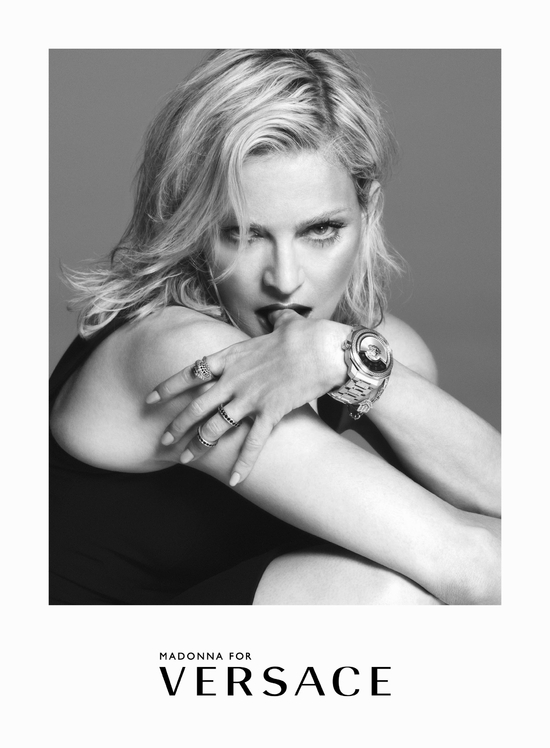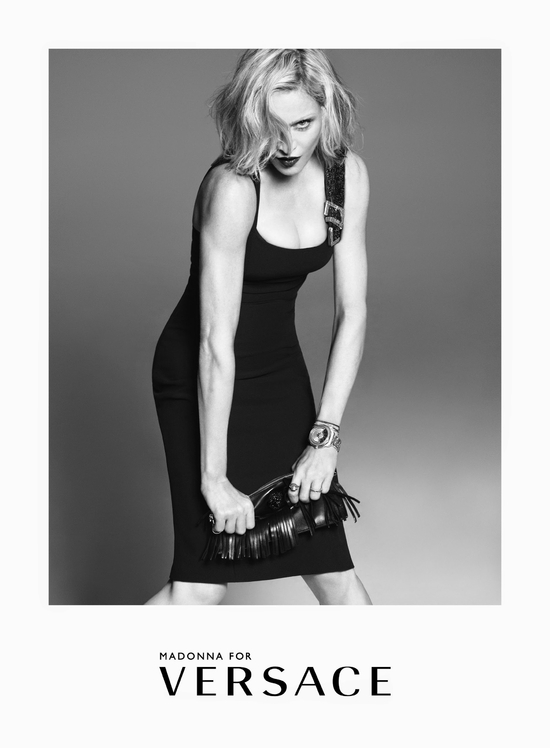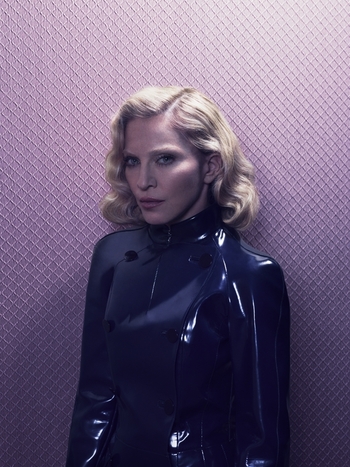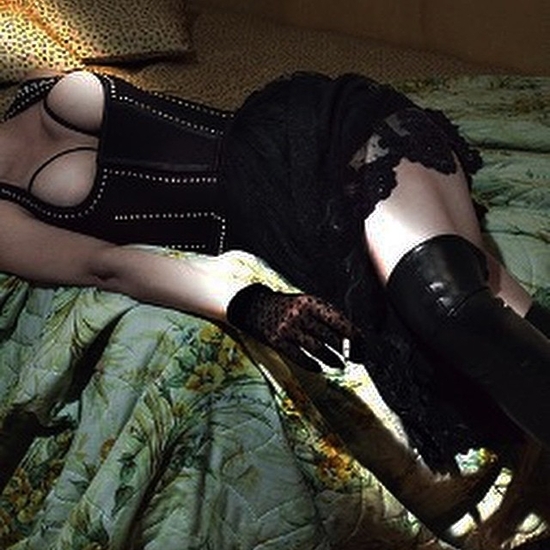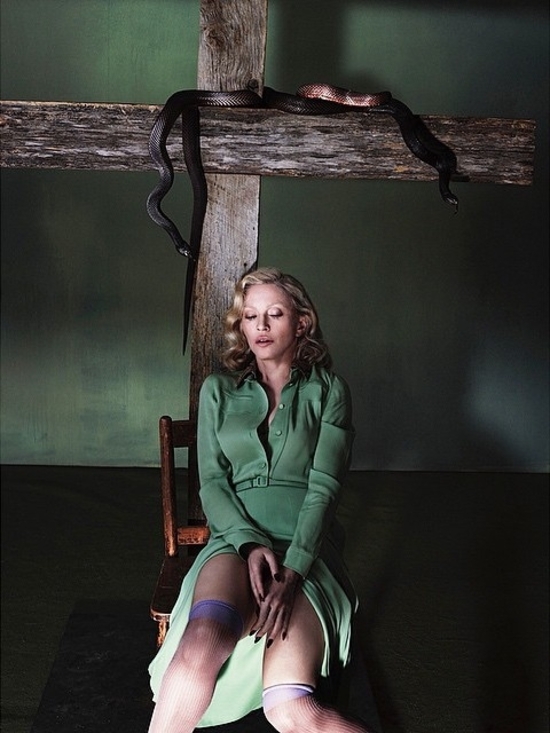-
Par Material Girl le 4 Décembre 2014 à 23:54Madonna est de nouveau l'égérie de la marque Versace.Elle a posé sous l'objectif de Mert Alas et Marcus Piggott pour lacollection printemps/été 2015 de la marque.
Madonna: "It’s always exciting to be dressed head-to-toe in Versaceand experience first-hand Donatella’s vivid imaginationand passion that she has created for this collection.""C'est toujours excitant d'être habillée de la tête aux pieds enVersace et de faire l'expérience de la vive imagination et de la passionde Donatella créées pour cette collection."
Donatella: "Madonna is one of the true icons of Versace.
I am thrilled to have my friend and the most powerful and
directional artist as the face of Versace for Spring 2015.
When Madonna asked me on set
"Which character do you want me to play?",
I answered "I want you to be Madonna and yourself",
and she laughed at me.
Madonna says it best herself: she is unapologetic.
She is her own woman, a role model who shows other women how
we can do what we want, and get what we want,
and do so for all of our lives, with no compromise."
"Madonna est l'une des vraies icônes de Versace.
Je suis très heureuse d'avoir mon amie et la plus puissante des
artistes comme visage de Versace pour le printemps 2015.
Quand Madonna m'a demandé sur le shooting
"Quel personnage veux-tu que j'incarne?", j'ai répondu
"Je veux que tu sois Madonna et toi-même", et
elle m'a souri.
Madonna le dit mieux que personne: elle ne cherche pas d'excuse.
Elle s'est faite elle-même, un modèle qui montre aux autres
femmes comment nous pouvons faire ce que nous voulons,
et avoir ce que nous voulons dans nos vies, sans compromis. "
Un portfolio de 12 pages devrait sortir au printemps 2015
dans les magazines Vanity Fair et les éditions Américaines,
Françaises et Italiennes de Vogue.
-
Par Material Girl le 2 Décembre 2014 à 14:46MADONNAby David BlainePhotography:Marcus Piggott, Mert Alas"God has given you one face," Hamlet said, "and you make yourselves another."
But had the great Dane met Madonna before saying the above and, in effect,
prophesying much of the modern condition, he might have added,
"and another and another and another ..."
The pop phenomenon born Madonna Louise Ciccone in Michigan in 1958
has, over the course of her career as a singer, songwriter, actress,
filmmaker, and pure entertainer, become the living
paradigm for the character-based, image-centric presentation of an artist.
And her evolutionary mutability—the quicksilver ability to grow and
change and live spectacular multiple lives in and beyond
the public eye—has given each viewer and each listener their
own favorite Madonna.
From her early years in rough-and- tumble New York City
of the 1980s to her Sex (book) goddess 1990s and the equestrian
splendor of the early aughts in England,
each chapter of her life is related as a kind of Dickensian
parable of perseverance, of will, or of self-invention,
as she weaves herself together out of blond ambition, yoga, or prayer.
And perhaps Madonna the Icon is herself her own greatest
work of art—something so vastly influential as to be unfathomable,
knitting together all of us for whom she has provided the soundtracks,
all of the sensibilities she has informed, rattled, challenged, provoked,
and then reimagined again, all of the notions of beauty, of an artist,
of a performer that she has shaped, reshaped, and upset yet again.
With a 13th studio album due out in 2015, Madonna is reaching a
new level of artistry, creativity, and, perhaps, identity.
Even as she reimagines herself yet again, she remains a masterpiece.
On a night this past November, Madonna sat down with her friend,
the performance artist, magician, card sharp, and similarly
unclassifiable talent David Blaine in New York to talk about
the power of silence, the necessity of failure, and hearing the word no.DAVID BLAINE: I brought a whole bunch of cards with questionsthat I think are really fun, so we have these as a backup plan.
MADONNA: A backup plan, or do you want me to choose one now?
BLAINE: Choose one.But I don't want you to go with the obvious card that'ssticking out more than the others.
MADONNA: I'm not that kind of person.I never go for the obvious. [picks a card]
BLAINE: Should I read it to you, though?
MADONNA: Yeah. I can't read your illegible handwriting.
BLAINE: This is a good one. So I stayed in a box for 44 days in complete isolation.It was a self-imposed solitary confinement.But ... I want you to close your eyes.Can you imagine what it actually feels like to be completely isolated,all by yourself with nobody to talk to?
MADONNA: For 44 days?
BLAINE: For a day. Have you ever done that?
MADONNA: No.
BLAINE: Okay, so think about it. What would it be like?
MADONNA: I'd really enjoy it at this point in my life.
BLAINE: Keep your eyes closed.
MADONNA: Okay, sorry. I think I would really enjoy it,stillness and quiet, because I feel like people are always talking to me,at me, asking things, questioning me, wanting information, work,music, loud noises, children—it's endless.So the idea of a whole day of silence sounds very seductive to me.
BLAINE: What do you think your brain would fill up with?
MADONNA: Ideas. [both laugh]
BLAINE: Ideas. You can do that while you hear noise.
MADONNA: I do, but when I come home from work in the studio,I just want silence. I don't want to talk to anybody.I don't want to answer any questions.
BLAINE: It's important to find that, once in a while.
MADONNA: I started doing yoga again, which I haven'tdone in years and years and years.I'm so used to exercising with music playing very loud, and when you do yoga,you're just listening to your breath, and I find that also incredibly ...What's the word? Not nurturing, but ...
BLAINE: Cathartic.
MADONNA: It's cathartic, for sure. But, no, it fills me up.I like the idea of going to one of those retreats where youdon't speak—like, silence for five days.I don't know if I could do that right now with small children.
BLAINE: Like what the monks do.I actually think that all monks, and saints at that extreme level of deprivation ...
MADONNA: It's essential ...
BLAINE: No, I think it's almost selfish.
MADONNA: It's not selfish if it makes you a better person.
BLAINE: When I do those things, it makes me a betterperson for the duration, and then when I come out, I'm like an animal.
MADONNA: But you're a selfish pig anyways—that's another story.[Blaine laughs] You're not plugged into the matrix.Okay, let me just fix the cards, because I have OCD.
BLAINE: [laughs] Hold on. Let's go further.Again, you're just going to close your eyes.Okay, no peeking. Now, you're on this chair, in this room,but you can't move from this table.You can lie down if you get uncomfortable.You can stand up, stretch, whatever you want.But you're completely alone. There's nobody to interrupt, nobody to talk to.What do you learn? Do you quit? Does it drive you crazy? What do you feel?
MADONNA: For how long?
BLAINE: You're going to be here for one full day.I've done 44, so one day is small.
MADONNA: I think the silence would be good with me,and not interacting with people would be okay.But not being able to move outside of the space would be hard.Not being able to walk around—the stillness of my body,physically—that would be the challenge.
BLAINE: Would you talk to yourself? Would you sing?
MADONNA: I would sing.
BLAINE: What would you sing?MADONNA: I don't know. It depends on what's going on in my life at that moment.A Shabbat song? [both laugh] "Shalom Aleichem." It's Friday night so ...
BLAINE: Do you remember your first favorite childhood song?Just out of curiosity.
MADONNA: I do. I don't remember the name of it.
BLAINE: How does it go?
MADONNA: You want me to sing it to you?
BLAINE: Of course! Are you crazy?
MADONNA: Is this part of the interview?
BLAINE: This is the best part!
MADONNA: Can I open my eyes?
BLAINE: Nope.
MADONNA: Oh, Jesus. So this is visual deprivation as well.Okay. [singing] I know a place where no one ever goes / There's peaceand quiet, beauty and repose / It's hidden in a valley,behind a mountain stream / and lying there beside the stream I findthat I can dream / Only of things, of beauty to the eye,snowflakes and mountains towering in the sky / Now I know thatGod made this world for me.
BLAINE: That was beautiful. Wow.How old were you when you heard that song?
MADONNA: My mother sang it to me when I was 4.My children know it too.
BLAINE: Okay, you can open your eyes. Cheers.
MADONNA: Cheers.
BLAINE: You knew lots of incredible artists in your early New York days.
What artists today do you hope will inspire your children?
MADONNA: Well, all those artists are dead.
BLAINE: Artists that are alive, that you know—who do you
hope will inspire the children of the future?
MADONNA: I like Banksy. I think he's inspiring and he speaks to
what's going on in the world, socially. I like JR. Like [Jean-Michel] Basquiat
and Keith Haring, who both started off as graffiti artists—their art
is on the street, available for anyone to see.
It's not elitist. You can see Banksy's work driving by it on the street,
and JR's work—the way he takes photographs of people
and turns them into heroes in their communities and makes
people proud of who they are.
My son is interning with JR right now and that's a great education for him.
BLAINE: In the cards, there's a question directly from JR.
But you're not going to get it now.
I should have forced you in that direction. But okay, it's fine.
MADONNA: [laughs] You're the most neurotic person who's
ever interviewed me, by the way.
BLAINE: [laughs] What movie scenes do you watch
over and over in your mind? Like, I see Daniel Day-Lewis
in There Will Be Blood [2007] over and over.
MADONNA: That's a great movie. I see Wong Kar-wai's
film In the Mood for Love [2000]. The slow-motion shot of that beautiful
Chinese woman walking up and down the stairway,
up and down the stairway, up and down the stairway, over and over again.
Everything about that movie, I could replay in my head.
The tracking shots of the camera when she's in the room with
her lover and they're eating together—that movie is so
beautiful, like a dance. Alain Resnais's film Last Year at Marienbad [1961],
also one of my favorites, was the film that created the idea
of dolly-tracking, I think. [Andrei] Tarkovsky is another of my favorite
directors, and there are a lot of beautiful shots in his movies.
BLAINE: Are there any scenes where the actor is doing a monologue ...
MADONNA: Oh, acting! I thought you were talking about camera work.
I can't think of a specific scene, but anything that Al Pacino does
in The Godfather movies, as Michael Corleone.
BLAINE: Or John Cazale sitting in the chair and yelling at ...
MADONNA: Well, no, who's doing the interview, me or you?
That's your scene. Me, I live vicariously through Michael Corleone.
I would like to deal with life the way he does.
When he's telling what's-his-name that he's going to go on
a little fishing trip. My God. Brilliant. Or the scene where Marlon Brando
is talking to his dead wife in the casket in Last Tango in Paris [1972].
BLAINE: "You pig fucker." Supposedly he was sick of acting
during that scene, so he started grunting like a pig in his trailer,
just to fuck around. And he walks out and improvises that
scene to his wife, and that's how it came out, "You pig fucker."
My favorite thing that Brando said, which I Googled before I came here,
goes something like, "You can always tell how great your career's
going based on people's teeth." He was saying that you can judge
what you did based on the amount of teeth that random people,
like the air stewardesses, show you when they see you, how big their smile is.
MADONNA: That's funny.
BLAINE: I think this is also a really important from: Henry Ford,
"Thinking is the hardest work there is, which is probably the
reason so few engage in it." And the reason
I say this is because when I met you ...
MADONNA: A hundred years ago.
BLAINE: I went with you to a museum and you had the whole
Edward Hopper show to yourself. I remember you were jotting
down ideas while looking at the art. I've done crazy
manual labor—I did construction—and I can say that it's
easier for me to do any stunt than it is to actually figure
out what I'm going to do. Thinking is the hardest thing.
Like a friend said when I was young,
"You know, what Michael Jackson does is easy." We were, like, 10.
But most people assume that it's easy because you work
so hard to make it look like there's no effort.
MADONNA: But that's our job. We're in the world of
creating illusions and giving people the ability to dream
and to be inspired or moved.
So you don't want people to see the labor behind it.
Also I was trained that, as a dancer, no matter how
much you're suffering, your face is relaxed.
You have to create that illusion. That's part of your job.
BLAINE: Would you say that thinking is the most difficult part of what you do?
MADONNA: No. Sleeping is the most difficult part of what I do,
relaxing afterwards. Letting things go.
Thinking isn't something you think about. It comes naturally.
Thinking involves many things. It involves being an observer.
It involves analyzing things, taking in what's around you in
the world and finding how to make it inspire your work or turn it into
a lesson to teach your children; it's paying attention to details.
That's what thinking is: processing.
BLAINE: Which is why it's important to have time.
MADONNA: We spoke about this earlier—setting aside time for prayer.
The ritual of prayer isn't a religious thing as much as it is
having a ritualistic moment to acknowledge things and
not take things for granted. For instance: the fact that you
wake up and there's air in your lungs; the fact that you have
a job to do; the fact that you have friends; the fact that you
have your health. You're going to do something that's
going to bring you joy. We take these things for granted.
And, you know, I think it's important to call angels to you to protect you.
BLAINE: You have to explain that.
MADONNA: Well, that's part of the ritualistic moment. The calling of angels.
BLAINE: What does that mean? What angels? Like, my angel is my mother.
MADONNA: Your mother is going to be with you regardless.
There are other angels that exist besides your mother.
My mother is protecting me, too. But she's not the only one.
BLAINE: Would you say that your mother is part of
the driving force behind you, a little bit?
MADONNA: Well, that's another question.
I'm sure that, to a certain extent, she is, but actually,
her lack of presence would be the driving force.
BLAINE: She passed away when you were very young.
Did it make you think that life is short?
MADONNA: I became very obsessed with death, and the idea
that you never know when death will arrive, so one has to
do as much as possible all the time to get the most out of life.
That would be a motivating force.
And death was a big part of my life growing up.
I went to lots of funerals ... But you digress. [laughs]
We were talking about Henry Ford. We were thinking about thinking.
BLAINE: I've asked some of my favorite artist friends to come up
with one question. Darren Aronofsky asked,
"Do you think people are intrinsically good or evil?"
MADONNA: I think intrinsically good. Yeah.
So there. [both laugh] We're all good, intrinsically,
just covered sometimes in filth and darkness,
and our job is to get rid of it, to peel back
the layers and reveal our goodness.
BLAINE: How did your early years in New York City around
great artists influence the choices that you make in your art today?
MADONNA: I remember having conversations with Keith [Haring]
and with Basquiat about the importance of your art being accessible to people.
That was their big thing—it should be available to everyone.
It was so important for Keith to be able to draw on subways and walls.
And Basquiat used to say to me, "You're so lucky that you make music,
because music comes out of radios everywhere."
He thought that what I did was more pop, more connected to
pop culture than what he did. Little did he know that his art
would become pop culture. But it's not like we really had
discussions about the meaning of art.
I remember hearing them talk about those things.
BLAINE: Did you hang out with them together?
MADONNA: Always. Martin Burgoyne, my roommate,
who was also an artist, Keith Haring, and Basquiat.
Sometimes Warhol would join us, but Warhol didn't talk that much.
BLAINE: So you were surrounded by the best artists
in the world. You were way ahead of your time.
MADONNA: Well, I survived. [laughs]
BLAINE: But you knew what was great before everybody
else knew what was great.
MADONNA: I was attracted to creative people.
You don't want to be the smartest person in the room;
you want to be the dumbest in the room. You want to be
surrounded by other thinking people who are going
to say something that makes you think,
"Oh, my God, that's an amazing idea. Why didn't I think of that."
And somehow we found each other in Manhattan.
That's the crazy thing. We found each other and
we connected to each other and we moved
around the city together. They supported my shows.
I supported their shows. We were a unit.
And I don't even know how it happened. It just did.
BLAINE: Did you learn a lot from them?
MADONNA: They were incredibly dedicated to their work.
I mean, Basquiat was my boyfriend for a while, and I remember
getting up in the middle of the night and he wouldn't be in bed
lying next to me; he'd be standing, painting,
at four in the morning, this close to the canvas, in a trance.
I was blown away by that, that he worked when he felt moved.
And they gave jobs to everyone. Keith would meet kids
on the street and ask them to come stretch his canvases for him.
Basquiat had every B-boy and every graffiti artist in his loft.
He was constantly giving everything away. I think they felt guilty
that they became successful and were surrounded by people who
were penniless, so they shared what they had. They were incredibly
generous people, and that rubbed off on me. You stay inspired that way.
I could never work in a recording studio where you have this lovely view
and a beach and the waves are crashing.
For me, it's all about being in a tiny room with little windows.
It's almost like you have to be in a prison.
And you can create beauty when you're in that sort
of deprived environment, which is a re-creation of your formative years.

BLAINE: I just heard the song "Devil Prays"
[from Madonna's forthcoming album], and it's fucking amazing.
And it's not like you were using drugs, but it's all about drug use ...MADONNA: Well, no, it's about how people take drugs
to connect to God or to a higher level of consciousness.
I keep saying, "Plugging into the matrix."
If you get high, you can do that, which is why a lot of people drop
acid or do drugs, because they want to get closer to God.
But there's going to be a short circuit, and that's the illusion of drugs,
because they give you the illusion of getting closer to
God, but ultimately they kill you. They destroy you.
I mean, I tried everything once, but as soon as I was high,
I spent my time drinking tons of water to get it out of my system.
As soon as I was high, I was obsessed with flushing it out of me.
[Blaine laughs] I was like, "Okay, I'm done now."
BLAINE: Was that song written to anyone in particular?
MADONNA: No, just sharing my experiences that there are different
ways to connect to a higher level of consciousness and that it's the devil's trick.
It is the illusion.
BLAINE: So when you write that type of song,
do you just sit there by yourself?
MADONNA: No, I'm working with a musician. He'll start playing a
guitar, and ideas just come to me. I have a computer on my lap.
I start typing lyrics, and I start thinking of a melody.
And then I try it out and say, "What do you guys think?"
Everybody's riffing off each other.
I like to see the words written; it inspires me.
Poetry, reading, language, playing with words—being around
talented songwriters, you develop an innate understanding
of what notes sound good together. I don't really think about it,
to tell you the truth. You listen to music, you read books, you watch films.
Other people's art inspires you.
I would be nothing without other people's art.
BLAINE: What else gives you material?
MADONNA: My children. Stuff they say. Like, my son came to
the studio the other day and said he didn't want to go home.
I said, "No, you have to go home; it's time for bed." And he said, "Mom, I feel like I'm isolated from your heart." [Blaine laughs] I was like, "Oh, that's a good line.
I have to use that." You get it everywhere, the high and the low.
You've got to be open to it all. Suffering is a big informer,
a big catalyst for creation.
You take your sadness, your despair, your sense of injustice,
and you put it in your work.
BLAINE: Is it easier to write when you're sad or when you're happy?
MADONNA: Sad. [laughs] Unfortunately. But it's okay, because I'm sad
most of the time, so we're good. Not sad, but upset about something.
BLAINE: Should we pick another card?
If you could go back and speak to yourself at age 7,
what would you say? How old were you when your mom passed away?
MADONNA: Six.
BLAINE: Okay, so, around that time. What would you say to her?
MADONNA: "Shit's going to get better."
[laughs] At that time, I had an obsession with being ill,
and I was constantly manifesting symptoms.
I'd say to her, "Everything's going to be all right.
" I would say to myself, "The feeling of ants crawling across your heart
does not mean that you have cancer. This life will be long,
and the world will unfold to you, and you will be able to realize
your dreams, and you will find people to be teachers and
guides along the way, and you will find mother figures
in other areas of your life, so don't despair."
BLAINE: That's fucking great. [Madonna laughs]
Okay. Next card.
So what if you woke up one day and music meant nothing to you?
MADONNA: That's impossible.
But I'd find something else that had meaning.
That's the kind of girl I am. I'd just find something else.
BLAINE: JR's question is, "Do you think artists can become leaders?"
MADONNA: I think they are. Bob Marley was a leader, for instance.
Bono is a leader. Some artists don't want to take that much
of a stance and become too political in their work,
but I think some people want to and do become that.
I think Maya Angelou was political and a leader, and John Lennon,
James Baldwin, just to name a few.
BLAINE: Another artist that I asked to come up with a question for
you is Edward Norton. He asks, "Is there an alternative path to the life you
chose that you think would have made you happy?"
MADONNA: Being a schoolteacher.
BLAINE: That's what my mother was.
MADONNA: Maybe I'm your mother in a parallel universe.
BLAINE: I think it's the most important profession that exists.
MADONNA: I agree.
BLAINE: That answers the next question, which is,
what's the most important profession?
MADONNA: Prostitution, of course. [both laugh]
BLAINE: What's your favorite physical feature on a man?
MADONNA: Eyes, and then hands.
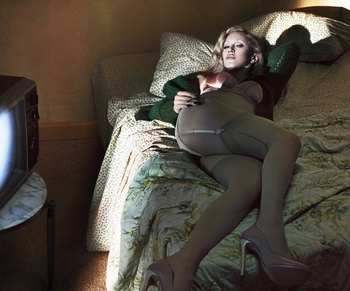 BLAINE: NASA put something in outer space that's calledVoyager 1, and it's filled with all sorts of human archives,stuff that if, in a billion years, the world doesn't exist,would still be floating out there for some other intelligent life to discover.What relics from humanity would you have put in the Voyager?
BLAINE: NASA put something in outer space that's calledVoyager 1, and it's filled with all sorts of human archives,stuff that if, in a billion years, the world doesn't exist,would still be floating out there for some other intelligent life to discover.What relics from humanity would you have put in the Voyager?
MADONNA: The music of Chopin. Water, because water is mercy,and you can't live without water.BLAINE: What would you put the water in?
MADONNA: A bottle that said "holy water" on it. [both laugh]A scroll of the Old Testament. A chessboard with chess pieces.Something to write with: blank paper and a fountain pen with ink.
BLAINE: What's the last thing somebody taught you?
MADONNA: I learned how to surf this summer.That was really hard. I got up. I rode a wave.
BLAINE: That must be tricky for you, because it's hard to fail.You're always seen as success, right?
MADONNA: Yeah. But every time I do shows, I learn a new skill.I always have to do something I've never done before.Like, last time I went on tour, I had to learn how to slackline,so that was a nightmare, because you keep falling off and youhave to keep getting back on, falling off, learning how to balance.That's really hard.
BLAINE: Is it hard to fail in front of the people you're working with?
MADONNA: I'm not saying I'm great at failing, but if you'rean artist and you're into the learning process, you accept that you'regoing to suck at things. I ride horses, and after not riding for a while,I always say to my riding instructor, "Okay, pretend I'm a beginner.I don't want to jump. I don't want to do anything extravagant.I just want to pretend I'm a beginner."And I don't judge myself. If I mess up, I've already put it out therethat I'm going to suck. My kids get me to do a lot of things that Iwouldn't normally do. I surfed because my son kept bugging me.I ski because my kids kept bugging me.And I say, "Well, why not? I'm going to suck at it, so that's okay."I'm good with that.
BLAINE: So you're good at accepting failure and moving past it.
MADONNA: In certain areas. [laughs] Failure is a challenge.Failure is an invitation.
BLAINE: Would you say you're like that with everything?
MADONNA: If I connect to it. I don't love to do everything.Like, I suck as a cook. [laughs] I don't feel inspired tocontinue cooking. If I had to for survival, I would.
BLAINE: Do you ever take a no? Does anybody ever say no to you?
MADONNA: They do all the time. But, yeah, how are we goingto turn the no into a yes, or how am I going to get whatI want in spite of the fact that I got a no, or how can I make this nowork for me in my favor? Or, okay, I'm going to accept this rejectionand I'm going to find another way to do it.I mean, nos are just as valuable as yeses in the game of life.In fact, they're essential. [turns to her reps in the room]Don't get any ideas, guys. Voilà.
-
Par Material Girl le 1 Décembre 2014 à 14:27Mert Alas dévoile sur Instagram les premières photos dumagazine Interview: The Art Issue - Madonna by David Blaine.Mert Alas cite la styliste Arianne Phillips, Andy Lecompte pour la coiffure,Lucia Pieroni pour le maquillage, le photographe et directeur artistiqueFabien Baron et Riccardo Tisci, le directeur artistique de la maison Givenchy.
-
Par Material Girl le 11 Novembre 2014 à 13:10Vendredi 7 et samedi 8 novembre 2014 a eu lieu la plus importantevente aux enchères de vêtements, d'accessoires et d'objets que Madonnaait utilisé tout au long de sa carrière ou dans sa vie privée.Julien's Auction a récolté la modique somme de 3,2 millions de dollars!Le vêtement qui s'est vendu au prix le plus élévé (252 000 $)est une veste du film Desperately Seeking Susan (1985),tandis que la robe rose que Madonna portait dans la vidéode Material Girl (1985) s'est vendue à 73 125 $.Une des robes du Who's That Girl World Tour (1987)s'est vendue à 50 000 $.La robe de mariée que Madonna portait lors de son mariageavec l'acteur Sean Penn en 1985 s'est vendue à 81 250 $.
-
Par Material Girl le 2 Novembre 2014 à 15:43Le 30 octobre 2014, Madonna assistait auKeep A Child Alive's 2014 Black Ball à New York (photos ici).La star portait une robe corset noire cloutée, une jupe en dentelleavec des empiècements de fleurs en cuir brodéet des bottes à lacets en cuir stretch noir Givenchy de lacollection printemps / été 2015.
 Suivre le flux RSS des articles de cette rubrique
Suivre le flux RSS des articles de cette rubrique




